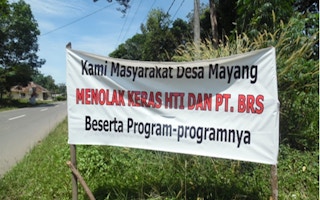Community groups have launched a protest against one of the potential suppliers for Asia Pulp and Paper’s (APP) new mill in South Sumatra, Indonesia, accusing the company of using intimidation tactics during a public consultation over land rights.
To continue reading, subscribe to Eco‑Business.
There's something for everyone. We offer a range of subscription plans.
- Access our stories and receive our Insights Weekly newsletter with the free EB Member plan.
- Unlock unlimited access to our content and archive with EB Circle.
- Publish your content with EB Premium.
Indonesia’s largest paper and pulp company is considering using PT. Bangun Rimba Sejahtera (BRS) as a fiber supplier for its new US$2.6 million Ogan Komering Ilir (OKI) mill, but community groups have objected to their land being used for BRS’s plantations, and are being backed by Indonesian NGOs Forest Peoples Programme, Hutan Kita Institute, Walhi Bangka Belitung and Rainforest Action Network.
The plantations would supply a mill - one of the largest in the world - expected to generate 2.8 million tonnes of pulp per year.
The community groups claim they were intimidated during a public consultation session, when the company brought in the police and army, according to a report from Indonesian environmental groups released in English on Thursday.
News that the mega-mill had quietly started operations at the start of this year prompted an outcry from NGOs. They said that the mill would mean that APP would risk violating the zero-deforestation pledge it made in 2013, damage Indonesia’s carbon-rich peatlands, and lead to more fires that have shrouded Southeast Asia in toxic haze for decades.
Now, community groups from the province of Bangka Belitung in South Sumatra are planning to protest the use of their lands by BRS for timber plantations. They have written letters and petitions to government officials to voice their opposition, and placed protest banners around the area.
BRS’s plans to supply fibre to the OKI mill could affect 100,000 people who live in and around the concession area, 15 per cent of which is covered by forest, and is farmed for a mixture of wild sweet honey, bitter honey, pepper, rubber, oil palm, durian and rubber.
If APP was to maintain commercial links with BRS despite these complaints, it would break its commitment to ensure that land is acquired from communities through a process known as free, prior and informed consent (FPIC), according to the NGOs.
FPIC is one of the key principles of international human rights law to protect indigenous communities from the destruction of their livelihood and culture as a result of land development.
Aidil Fitri, director of HaKi, said in a press statement that “APP has made a commitment that any new concessions or fiber used to supply the OKI mill will respect the rights of affected communities to give or withhold their Free, Prior and Informed Consent.”
“If APP brings BRS on as a supplier it would clearly be breaking its own sustainability policies and its promise to respect human rights,” he said.
Lafcadio Cortesi, Asia director, Rainforest Action Network, commented: “There is a lot of concern that the OKI mill will drive more social conflict, peatland drainage and deforestation.
“This is a test case for APP. Pulp and paper customers and investors will be watching whether APP will be true to its word and avoid suppliers like BRS,” he said.
APP has pointed out that OKI mill will play an important role in meeting growing market demand for pulp and paper, and will create around 10,000 jobs, directly and indirectly, with a priority on hiring South Sumatrans.
In a statement, the company clarified that BRS has not been selected as a supplier for its mill, and no activity has taken place in the BRS concession area.
It added that a supplier review process for OKI mill is currently underway, and is being conducted according to its Forest Conservation Policy outlined in 2013, which would include an FPIC process with local communities.
In response to the protests made by local community groups, APP said it “is committed to listen to the community’s concerns and to respect the rights of communities as per our commitment to the Forest Conservation Policy.”
“If the result of Association Procedure [supplier review] recommends APP to accept BRS as a supplier, APP will respect areas that are owned and managed by the community as the source of their livelihood. These areas are likely to have been identified under the integrated High Conservation Value (HCV), High Carbon Stock (HCS) and Social Impact Assessment, which has been completed in BRS,” the company stated.
The company added that it was “committed to being open and transparent” about its operations, and aimed to become “a leader in responsible production” through its forest conservation policy. This was highlighted as protecting national forests, peatland management best practice, social engagement and resolution and sustainable fiber supply and sourcing.
The news emerges less than a fortnight after APP abruptly cancelled a trip for sustainability publications Eco-Business and Mongabay to visit the mill.
The company said that it was not ready to share the sustainability side of the mill’s story, after initially inviting the media to cover its forest conversation policy and fire management strategy - a key part of which was empowering local communities with the means to earn a living from the forest without resorting to harmful land clearing activity.

















